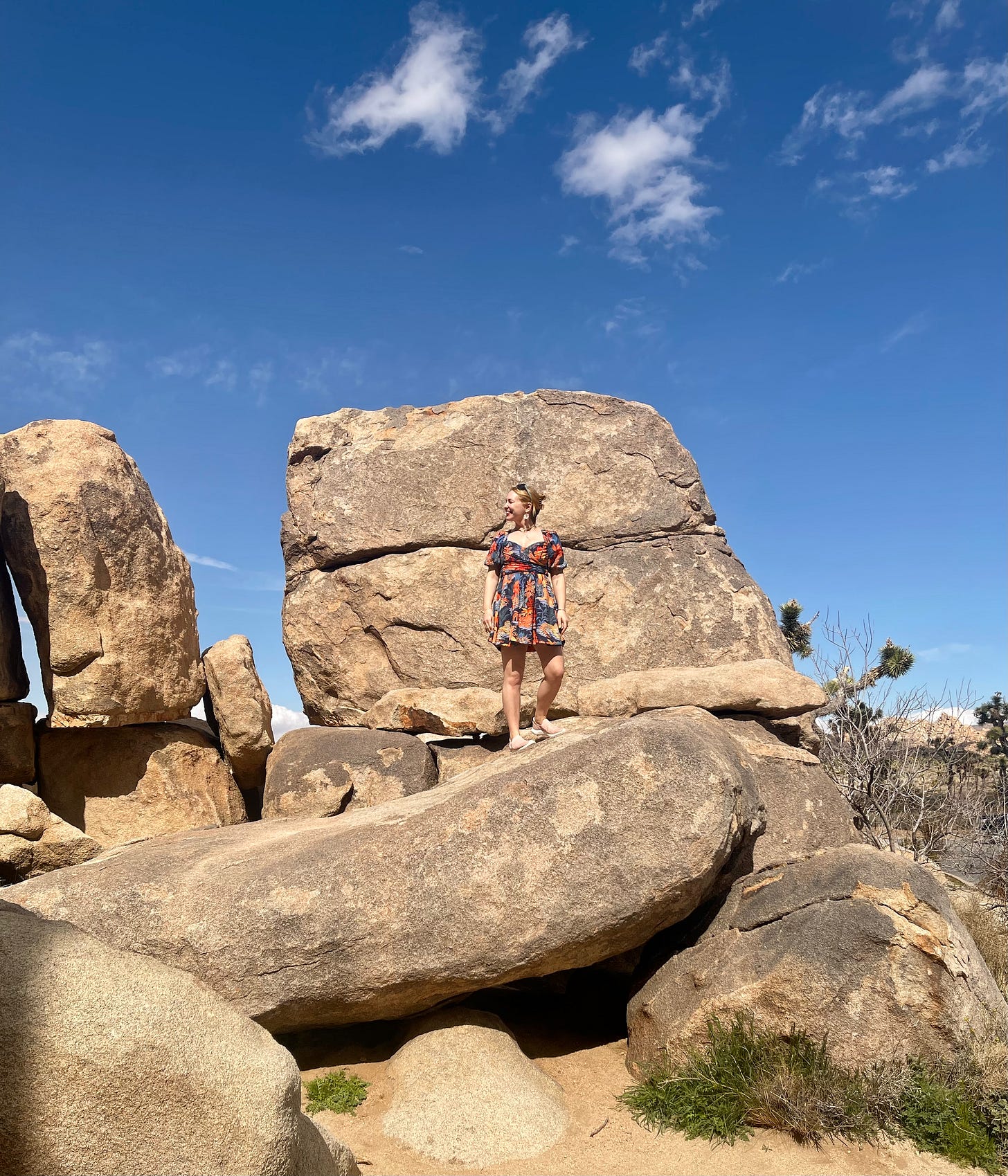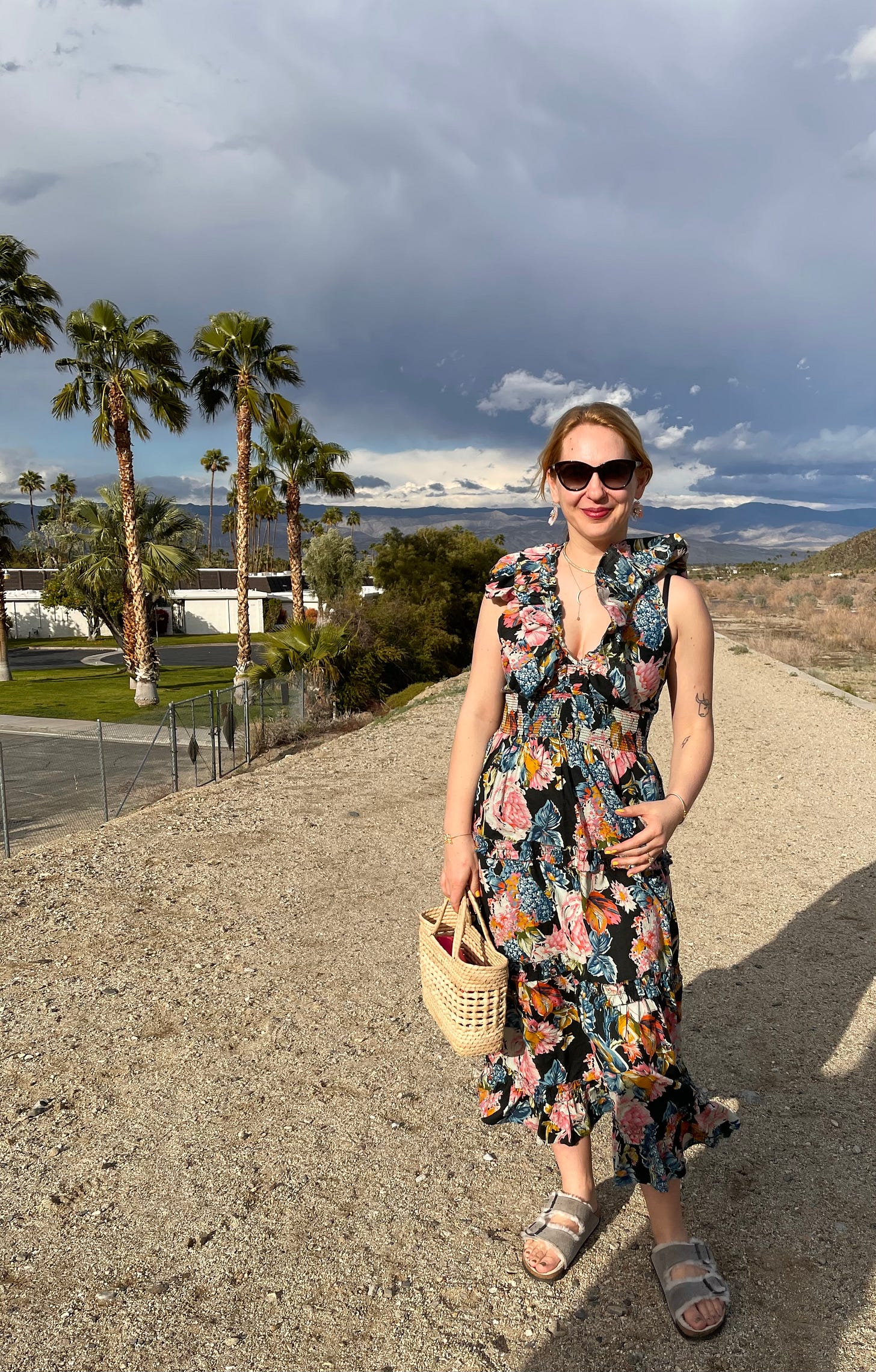Singing in the dead of night
I'm wondering how joyful grief can be
One of my favorite genres of music is the “joyful breakup song.”
I don’t mean the triumphant, I’ll show him / I’m feeling myself genre (the urtext of this category, I Will Survive, basically launched Lizzo’s career a decade before she was born).
I mean tender songs that genuinely send affection and gratitude for the chapter that is closing. They are wistful yet wise, seemingly written by a ‘higher self’ with perspective far above the chaos of tangled emotions of fresh loss.
Joy infuses these songs, even the one by Anais Mitchell which was written after her friend’s death. I can easily see how its buoyant send-off could be applied across all sorts of farewells.
Songs like these give baby steps to joy so it can accompany grief. The sentiments are building blocks for practicing joy during moments of greater pain and less visible hope.
I’ve been listening to them as I’m in a season that is soaked with grief and warmed with joy at the same time, and I don’t want to betray myself by ignoring either.
I’m celebrating my engagement at the same time as I’m mourning my stepfather, at the same time as I’m hurting from the ‘living loss’ of one of my best friends a year and a half ago to a massive brain injury.
The engagement has even brought up versions of grief with no language to describe them: My fiancé and I won’t be together forever until we both die at the same time, preferably as we gracefully transition to our deaths during a snorkeling trip in the Maldives. Additionally, I’m closing a massive chapter of life that I really treasured, and there’s bittersweetness in that. I also want to be present to the new chapter.
Isn’t life always like this?
I used to think fall was the truest display of grief from nature: How elegantly the trees released their technicolor leaves to fall, and die.
Now I see the greatest truth in spring. It’s wormy and damp, foggy and warm. Grief is so convoluted. So weird. So floral.
I was in a weird and floral part of the country this past week. The first thing I noticed was the intense smell of dry soil, strongly reminding me of the dusty town in Argentina where I was blissfully sabbatical-ing as the pandemic unfolded in the northern world.
The next thing I noticed was the birds. They were as big as hawks but ink-black in color. When I first saw one solmenly perched on a palm outside the airport I thought, WHAT IN THE EDGAR ALLEN POE IS THAT?!
Then I watched them fly in a group and I was flabbergasted at their wingspan. I frantically researched “black birds in the Mojave desert” but I couldn’t find anything conclusive, despite seeing them everywhere.
So I asked a local what type of bird they were, and she replied, “I haven’t noticed them.”
SHE HADN’T NOTICED THEM?!?
I haven’t noticed anything BUT these majestic keepers of the sky who seemed to circle the land in protective reverence. It was like a New Yorker who’d never noticed pigeons! The birds were the most prominent citizens in an otherwise tan landscape! Were they like the black horses in Harry Potter, visible only to those who had witnessed death?
I went on the trip with my mom, and we’re both only just beginning to process my stepfather’s death. Every wonderful thing we saw, we wished he could have seen too. I took a long walk to the edge of town that I thought would uplift me, and it just made me so sad that he couldn’t experience all this with us.
I’m remembering a Sufjan Stevens lyric I listened to a billion times for months after my dad died:
Should I tear my eyes out now?
Everything I see returns to you somehow
Should I tear my heart out now?
Everything I feel returns to you somehow
On our last day, I went to the hotel pool in the morning before anyone else was there. Water is my healer and teacher, even hotel pool water with piped-in dubstep at 7am.
I listened to my own music on shuffle. I invited my body to move as she wanted to, and I danced underwater like a prima ballerina and twisted into limb-pretzels that would permanently injure me in an on-land yoga class. I felt like SuperMari.
I happened upon a song that I played a lot when I still fancied myself a bohemian hippie, and I remembered how I once endeavored to be the most alive person who has ever lived. I wanted every experience a person could have!
And even though I was desperate to commit to a home and I ached to commit to a partner, I was terrified that commitment would hinder me from attaining my gold medal in the Aliveness Championship. I thought commitment, or any surrender to mundanity, would be a threat to my life’s fullness—a premature deadening.
During that pool swim, I tried to feel as alive as I could feel. Full aliveness felt so different than it did years ago, when I thought that the life-iest life could be was while traveling as far as I could go and tasting new languages on my tongue.
This time, aliveness felt like the wonder of weightless water ballet, anchored in heavy sadness. I watched the pool waves make sun-splotched patterns on the tile floor and I watched those black birds swarm in a spiral up above and questioned whether they circled only for those of us who noticed them.
The birds flew around the pool as though they were orchestrating a funeral, only there was no dead bird beneath them. There was only me, the one person on the rooftop where they circled above. I wouldn’t be surprised if they could intuit my grief, and I wouldn’t be surprised if they were ritualizing their own.
To be fully alive in that moment was to feel my limbs swirling in the water as though I were more spirit than body, and also to feel myself weighed down by the awfulness of life that will never be okay.
To look to the pristine sky and to see black birds swirling above: that felt like staring life right in the face. Here it was: sun, sky, black birds, and tears dripping into turquoise pool water.
This is as close as I’ve ever gotten to infusing grief with joy: swimming in a rooftop pool and watching birds that danced for me only. I wonder how many other people in the desert were noticing those birds. What or who had they lost?
The word sadness calls to mind images of crying or moping around aimlessly while listening to the Magnetic Fields, but we all know that sadness can be expressed in so many other ways. The origin of ‘sad’ comes from the Old English sæd which means “full”—it’s where we get our words satisfied and sated.
When I think about sadness as fullness, it reminds me that to be the most alive person who has ever lived means allowing sadness to fill me to the brim, even when I’m already full with the pleasure of swimming on a rooftop.
Sadness can look like a joyful swim, and fullness can look like a sad walk through a beautiful landscape. Wouldn’t it be interesting if our language had stopped evolving at “I feel full” in order to express “I feel sad?”
I’ve been studying people who rejoice while suffering and they all have strong beliefs in the following themes:
The resilience of the human soul
The promise of things to come
The sense that there’s something bigger than us, the underlying joy of loving spiritual connectedness
No reason to ever be defeated
The inherent goodness of the world
And they practice and cultivate these beliefs every day, while in the airport security line and while on the phone with customer service and when the grocery store is out of their favorite snack. Then they are really put to use when the Big Stuff happens.
I like to think I did a bit of all this last week: a tasting menu of these traits that I would so love to embody.
I thanked God for every lovely thing that happened (positive feedback since my love language is gifts).
I allowed myself to gasp at the sight of a mountainside at dusk, not holding my breath back as penance for my unearned survival.
I danced with enjoyment in the art museum even when I felt like I should look away from the beauty could never been witnessed by my lost loved ones.
When we lose someone, it’s so easy to attach to the bitter and ugly sides of the world, as though this was the reality all along. I’m forever in awe of those who have suffered massive losses and still find plenty of reasons to love the world and cherish life.
The chapter that came before this one was all about doing everything I possibly could in order to live a full life. Now it’s about feeling everything inside, and noticing how those sensations expand my soul and, apparently, my eyesight. If we have to suffer in order to be able to see the black birds, I’ll take the pain. I never want to miss how full this world is: of sweetness, of sunlight, of sadness.
Have you ever been on a ‘Grief Vacation?’ (My friend used that phrase to describe our vacation, then noted that it sounds like something white spiritual people would advertise online.) Are you joyfully grieving or sorrowfully rejoicing? Do you know what those birds are called?






Oh - this piece makes me feel so wonderfully seen.
A sliver of opera singer jargon I’ve retained from my classical training is the Italian term "chiaroscuro."
It's referenced in Baroque art, as well, but in the context of operatic singing, it refers to an aspirational vocal quality, in which the bright and dark qualities of one’s vocal tone intermingle to create a rich and vibrant sound.
Literally in Italian, "chiaro" means "light," and "scuro" means "dark."
Of course, yin and yang did it first in terms of philosophy, but the comparison draws itself. The light and darkness and joy and pain of this mortal coil coexist at once, begetting all that is wondrous and fascinating about being human.
Your writing captures this experience in such an eloquent way. Thank you for sharing. ❤️
Sorrowful joy/joyful sorrow ... ever so Buddhist. Pema Chodron writes of the gloriously wretched ... we can all relate.
The large winged black birds that circle over my tree farm retreat are Black Vultures and/or Turkey Vultures ... They make my heart soar as they ride the thermals with effortless ease. The Turkey Vultures Latin name is Catharses Aura. I love that ... they are natures sanitation team ... they eat carrion. They may symbolically 'clean the aura' of those dancing the sky with them as you so beautifully describe.
I celebrate your joy and embrace you in your sorrow.